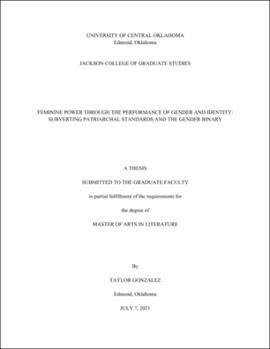| dc.description.abstract | This thesis examines strategies for exercising feminine power within patriarchal settings; in particular, it addresses the ways in which female characters access varied forms of power through gendered performances that problematize or transgress the gender binary constructed and enforced within patriarchal societies. The thesis focuses on three literary works, The Song of Achilles by Madeline Miller, Fantomina by Eliza Haywood, and Orlando: A Biography by Virginia Woolf, in which the central character, through performances that expand or subvert assigned gender roles, struggles to gain and use traditionally masculine forms of power within the context of patriarchal societies. These characters' efforts to maintain power highlight the fact that women are unable to access power except through gender-performative actions, whether by exaggerating their femininity or by emasculating themselves through their actions or ideals. This thesis applies a variety of critical techniques drawn from the fields of feminist and queer theory and cultural studies to account for the ways in which women obtain masculine power through gender-performative actions in a variety of time settings and in their varied relationships with male characters. In The Song of Achilles, Thetis is unable to obtain any lasting hold on power because she uses her son, Achilles, as a point of access. After Achilles' death, she loses her desire to obtain and wield power in a patriarchal and mortal society. Briseis, the minor female character who mirrors Thetis, loses her position of value within the male community when Patroclus dies, leaving her unprotected, and she chooses to immerse herself with Thetis, a sea nymph, in the primal embrace of Thalassa, the feminine aspect of the sea, rather than to remain in the perilous mortal community where she is valued only in terms of her transactional value among men. The original intention of Fantomina's protagonist in assuming different personae quickly morphs from innocent curiosity into a desire to excite and retain the attention and love of Beauplaisir. By setting a male-oriented goal, the character "Fantomina" commits herself to playing roles scripted by patriarchal values, and this sets her up for failure stemming from a form of internalized oppression. As Marilyn Frye observes about men, "In their relations with women, what passes for respect is kindness, generosity, or paternalism; what passes for honor is removal to the pedestal. From women they want devotion, service, and sex" (135). "Fantomina" narrows her opportunities by performing only in female roles, because the only people whom men truly respect are other men. She therefore loses Beauplaisir, she is unable to keep her daughter, and she has her freedom stripped from her by being exiled to a French convent. In juxtaposition to the dire ends of these female characters, Orlando opens new avenues through its protagonist, the gender-fluid Orlando (they, them, their). Beginning from a male perspective and shifting to a female position, with androgynous moments in between, Orlando creates a space outside of the patriarchally enforced gender binary and its corresponding expectations. As an outlier to these standards and to English society, Orlando is able to obtain a power that is truly their own rather than an authority bestowed by or borrowed from men. Thus, when the novel ends in 1928 as women gain political suffrage in England, Orlando chooses to put motherhood aside and expresses hope for further progress for women in the future. The review and analysis of these literary works demonstrates that women are unable to gain any advantage, in power or otherwise, while operating within or on the basis of a male-oriented set of standards. Patriarchal points of access provide no opportunity to acquire or exert feminine power. Women will remain inferior in a system made by and for men as long as they are fully immersed in the constructs of a gender binary. Only by breaking from set categories, as Orlando does through androgynous presentation and gender-fluid behaviors that are informed by an awareness of traditional male and female perspectives can women make genuine progress in acquiring and wielding a power that is not built upon the oppression and segregation of women. The connection among these literary texts, beyond their focus of female characters reaching for power, is the authors' female perspective on the characters and their experiences. Because these works were written by women, the reader is forced to view, experience, and sympathize with each character from the perspective of a female authorial gaze that propounds a different set of ideal attributes and expectations for female characters from those typically imposed by an objectifying male perspective. Under the female gaze, the feminine characters become more accessible to the audience, allowing readers to understand the characters' actual motives and desires: to obtain power by having their voices heard and by achieving agency. | en_US |
